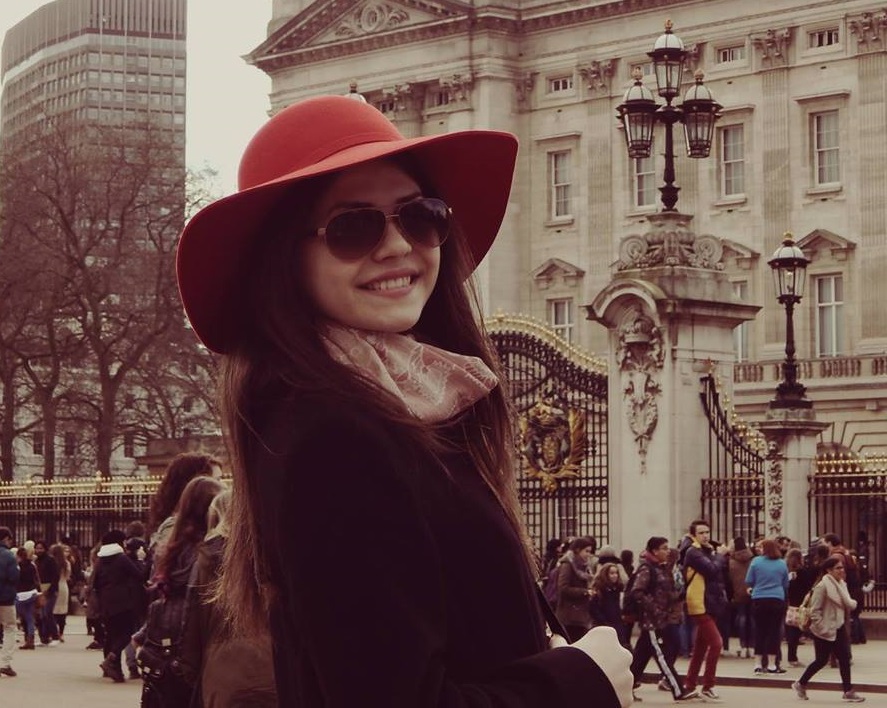”I Will Become a Detective, Anyway, Only in Journalism”
She is one of the graduates who were convinced they would never do journalism before they came to the SAJ. As a child, she dreamed of becoming a secret agent or working in a crime laboratory: that desire was inspired by the movies she was watching at that age and by her great passion for chemistry and biology. Not all dreams, however, come true; after she passed her bachelor degree examinations, she applied to the Faculty of International Relations and Political and Administrative Sciences at Moldova State University.
She wanted to contribute to changing the situation in the country after her graduation and to help people live prosperously here, in Moldova. But everything changed after she took part in the Challenger II Program… We are speaking of Liliana Botnariuc, a graduate of the class of 2016-2017, currently a reporter at the Ziarul de Garda newspaper. We have invited her for a cup of coffee and asked her what made her become a journalist and what journalists and secret agents have in common...
My decision to study at the SAJ was no coincidence
“During one of my volunteer days at Challenger II Program, Vlada Ciobanu, one of the graduates of the School of Advanced Journalism, told us about the SAJ, its courses, trainers and so on. I recall one very important thing she told us at that meeting: ‘At the SAJ, you learn what others are taught during their three-year studies at university.’ I was only in my second year, yet I already knew I would attend that school. During my third year of studies, I wrote my license degree thesis, and the topic I chose was The Role and Place of Mass Media in the Foreign Policy of States in Contemporary Times. I guess it was no coincidence. I have to admit that I greatly enjoyed the documentation process; I adored writing a single paragraph all day long just to make a good paper. At that point, I understood two important things:
- the power of the media is unlimited;
- I like writing, and I like writing a lot.”
I was eager to develop my critical thinking and learn to write correctly
“Immediately after graduating from university, I applied to the School of Advanced Journalism. I did not hesitate for a moment, and I had two reasons to do that: I was eager to develop my critical thinking and learn to write correctly. I’m not sure whether I have learned to write very well, I keep working at this skill, but as to my critical thinking, I have cultivated it. Today, I question every sort of media content, discourse, or information.”
A bit of theory and a lot of fieldwork
“All of the courses have been useful, especially due to the fact that they are focused on practical work. A bit of theory and a lot of fieldwork – that’s exactly what a journalist needs. I like the fact that it took me just a few months to learn to use editing programs: Adobe Audition, Adobe Indesign, Adobe Premiere and Adobe Photoshop. The most important thing is that thanks to the SAJ I not only love print media, but I also learned to accept criticism and intend to become a very good and professional journalist.”
I like discovering people with interesting stories
“At the moment, I am at the starting point of my career, and I have chosen to work in print media, because I like discovering people with interesting stories. I have a lot of passion for investigations, too; I intently watch what my colleagues from Ziarul de Garda and RISE Moldova do, and I hope to do an investigation of my own one day. So, in a way, I will become a detective, only in journalism. The trainers teaching investigative journalism at the SAJ are my colleagues now. I have learned from them that in journalism one needs to have a well-developed spirit of observation and, what is more important, you have to be always objective, impartial, and unbiased in any article you write.”
Media is power, and we can change things as journalists
“I recall that, during my admission interview to the SAJ, the School’s Director Sorina Stefarta said that some journalistic investigations had overthrown governments. I am convinced that in Moldova, too, the situation may be changed due to the media, among other things, but journalists have to do their work honestly, correctly, and only for the benefit of their reader, viewer or listener.”

